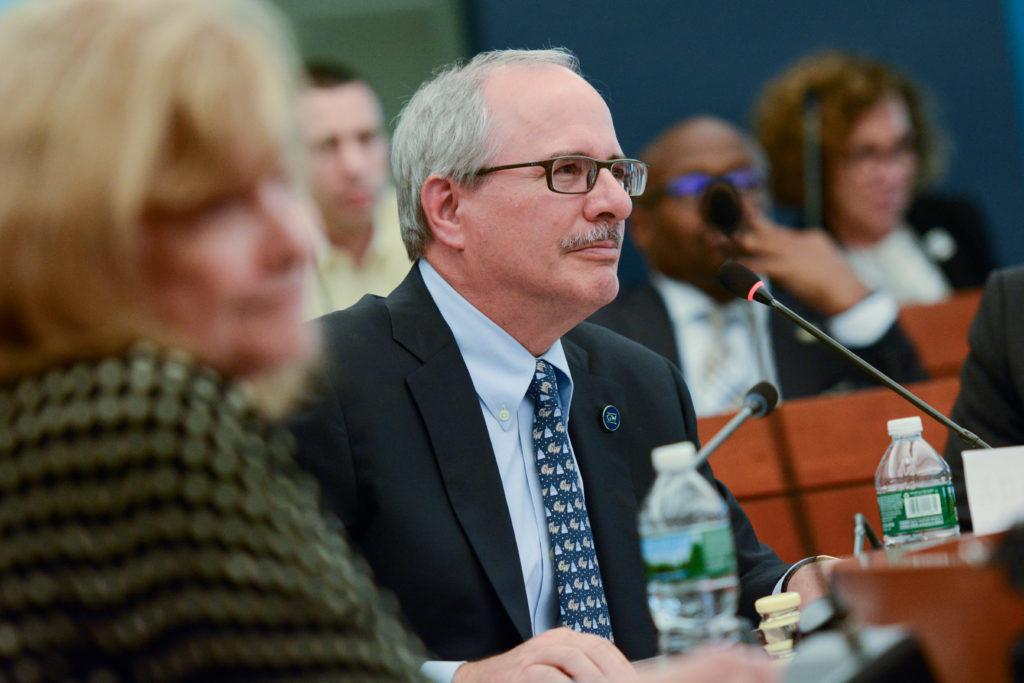A number of faculty welcomed University President Thomas LeBlanc’s focus on GW’s institutional culture, saying it signaled a shift in the University’s priorities.
In his first weeks on campus, LeBlanc told audiences in speeches, interviews and town halls that GW has an overly bureaucratic culture that makes students feel unwanted and faculty unheard. Some faculty said it was encouraging that after deep budget cuts and persistent red tape in recent years, LeBlanc seemed to be paying more attention to how those decisions are impacting campus life.
In an address to the Faculty Senate earlier this month, LeBlanc laid out five key points he hopes to address during his time as president, including improving the undergraduate student experience and leading a culture change to make University offices more welcoming and accommodating.
Harald Griesshammer, a professor of physics and a member of the Faculty Senate, said he agreed with LeBlanc that GW’s institutional culture was too focused on finance and not enough on making sure students had the best on-campus experience.
“I think you hit the nail on the head with the problem that everything is finance driven here,” he said to LeBlanc at the Faculty Senate meeting.
Griesshammer said GW’s urban setting can also make it difficult to build a community between faculty and students because the high-cost of living in Foggy Bottom forces many faculty and administrators to live far from campus. He said most faculty leave the area after business hours and don’t have a chance to get to know students.
“The issues with campus culture, I think he’s very aware of that,” Griesshammer said in an interview. “These are all little things which add up to the campus experience.”
Ivy Ken, an associate professor of sociology and the president of the Faculty Association, said it was encouraging to see LeBlanc beginning to look beyond finances to measure University priorities and programs in other ways.
“He seems to understand that a balance sheet is not the best indicator of the health of the University,” she said in an email. “If this means he is prepared to improve the culture of education at GW by supporting the strong working conditions of its faculty, the GWU Faculty Association stands ready to work with him to make this possible.”
Henry Nau, a professor of political science and international affairs, said cultural issues may be a leftover effect from the University’s history as a professional school and not a campus community around 40 years ago. This attitude has led to alumni feeling disconnected with the University and is a major reason why GW’s alumni giving rates have traditionally lagged behind its peers.
He said the current institutional culture leads to tense relations between faculty, administrators and trustees because there has not been a relationship built up between the groups that would help them communicate their ideas to one another.
“Be an administrator, do your job, but at the same time realize that if your business is learning, it starts with your faculty unless you want to turn this into a shopping mall or a department store where the administration collects your money, you get your sandwich and you go,” he said.
Other faculty said LeBlanc couldn’t achieve his University-wide vision without paying significant attention to the budget because the University has been on difficult financial footing in recent years and initiatives to improve campus culture would require a large investment.
Starting with the 2017 budget year, central administrative units had to slash their budgets annually for the following five years and in 2016, about 40 staff positions were eliminated as a result of the cuts.
Anthony Yezer, a professor of economics, said none of LeBlanc’s programs could be enacted unless the University get its finances and its long-term goals back on track.
“One of the reasons why we blunder along now is because we don’t have a business model,” Yezer said about the University’s current financial state. “We formulated a strategic plan without a business model and it all collapsed. We have massive budget cuts now. People can’t be replaced. We have a freeze on tenure-track faculty slots.”
In 2014, the University was forced to cut more than $8 million from its strategic plan facing a budget shortfall, though last year Provost Forrest Maltzman said the plan was on track to achieve many of its goals.
LeBlanc also told the Faculty Senate that he wanted to continue to build up GW’s research offerings to keep faculty and students engaged in discoveries within their field of study.
Ormond Seavey, a professor of English, said he was glad to hear LeBlanc had discussed the English department when talking about his review of research, which showed LeBlanc’s interest in all aspects of research, not just from scientific grants.
“For the humanities to do better it’s not the matter of getting a new building for ourselves,” he said. “It’s a matter of there being respect for the kind of work we do and some abbreviation of we’re all in this together.”



